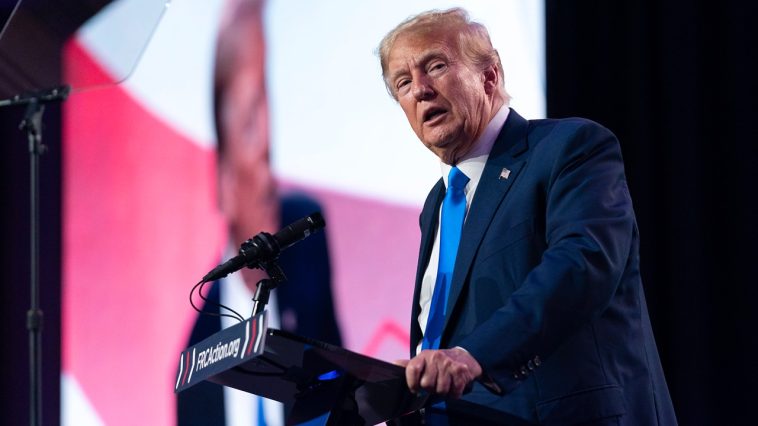LISTEN HERE:
Just a few days ago, Eleni Kounalakis, the Lieutenant Governor of California, penned a communique to the California Secretary of State, Shirley Weber, urging maintenance of stringent legal barriers to keep the name of ex-President Donald Trump out of the California 2024 presidential primary ballot.
This bold move came hot on the heels of a similar development in Colorado, where the state’s Supreme Court ruled out Trump’s appearance on its primary ballot in the upcoming elections. Given the gravitas of this decision, Kounalakis expressed her desire that California should follow the same path.
Having analyzed the details of Anderson v. Griswold (2023 CO 63), a case which sealed Trump’s fate on the Colorado ballot, Lieutenant Governor Kounalakis implored Weber to comb through every possible legal avenue to maintain equivalency between California and Colorado in this matter.
Notably, her efforts seem to be geared toward protecting the sanctity of the ballot and the republican principles that the United States was founded upon. Indeed, she pinpoints the pivotal ‘rule of law’ as the driving force behind her motivations.
Kounalakis stressed on the verdict declared in Colorado, referencing it as a blueprint for potential similar actions to be taken in California. She highlighted, conjecturally, that the Insurrection Clause could be brought into play – a clause declaring any insurrectionists as ineligible for presidential candidacy.
Rooting her explanation in the constitutional mandates about the age eligibility of the presidential candidate, she indicated the progressive stance California is renowned for and the necessity for it to uphold the same.
Interestingly, she fumbled the minimum age requirement for a presidential candidate, stating it as 40 instead of the actual age of 35, but the crux of her message hinged on evaluating eligibility beyond just age. The broader scope of such evaluation considers the potential influence of the potential candidate’s historical activities on their future candidacy, warranting diligent legal exploration in light of recent events.
The Colorado Supreme Court’s verdict, passed with a narrow majority of 4-3, was essentially driven by the understanding that President Trump’s comments leading up to the Capitol Riot of 6th January were indicative of an attempted ‘insurrection’.
To substantiate their decision, they referenced Section 3 of the 14th Amendment – an area of the Constitution which primarily deals with disqualifying individuals who betray the country from holding public offices.
This section essentially brick-walls any individual from holding public office – appointments ranging from being a member of Congress, a Presidential or Vice-Presidential elector, to even civil or military service under the Federal or any State government – after they’ve been proved guilty of engaging in rebellions or insurgencies against the ‘same’ – in this case, the Constitution.
The decision from the Democrat-appointed judges, most of whom are Ivy League graduates, sends a clear message – they believe that Trump satisfies the criteria enshrined within this very section.
The authors of this decision, however, have attracted criticism and debate from conservative academia, which largely disagrees with their interpretation of the rule and its application to a president, and argues whether the ex-president’s activities meet the benchmark of ‘insurrection’.
The Colorado Supreme Court, undeterred by these objections, moved ahead with its decision by prescribing a deadline for Trump’s removal from the state’s ballot by January 4. In response to this, the ex-president’s legal squadron is gearing up to challenge this verdict in the country’s apex court, the Supreme Court.
The state supreme court’s perspective on the matter was documented in the opinion released subsequent to the verdict. It stated that Trump didn’t simply incite the insurrection, but stood by his inflammatory rhetoric even when the country’s primary legislative building was under attack, repeatedly pressuring Vice President Mike Pence to neglect his constitutional duties, and urging senators to halt the electoral vote count. The court designated such actions as direct involvement in the insurrection.
The court’s opinion emphasized the fact that the evidence, most of which remained uncontested throughout the trial, was sufficient to establish President Trump’s involvement in an insurrection. The court also noted that Trump had directly and plainly encouraged his supporters to march to the Capitol based on unfounded allegations of voter fraud, declaring his actions as indisputably willful and intentional.
Steven Cheung, a spokesman for the Trump campaign, rebutted the decision in his statement, disclosing their proposed line of action in face of this decision. He censured the Colorado Supreme Court, expressing little surprise at its ruling against President Trump, given that all justices were Democrats.
Cheung expressed concerns that the growing lead of President Trump over the President Biden in the recent polls has the Democrat leaders on edge and that this decision is their desperate attempt to avoid potential electoral defeat next November. He described the leadership of the Democrat Party as paranoid, attributing it to the faltering grasp of the Biden administration on power.
Taking a dig at the verdict given by the Colorado Supreme Court, Cheung defined it as significantly flawed and announced plans to challenge it swiftly in the Supreme Court of the United States. Further, he highlighted their intentions to request a stay against implementing the verdict in a bid to uphold democracy.
Trump’s team displays great confidence in securing a favorable ruling in the Supreme Court to end what they perceive as un-American lawsuits. They are steadfast in their belief that these allegations stand on shaky grounds and are thinly veiled attempts to stifle the democratic process.
Regardless of the lawsuits’ outcomes, this chapter in American political history serves as a testament to the resilience of democracy, the vitality of its legal constructs, and its willingness to scrutinize individuals in the highest offices with only the Constitution as its guiding light.



